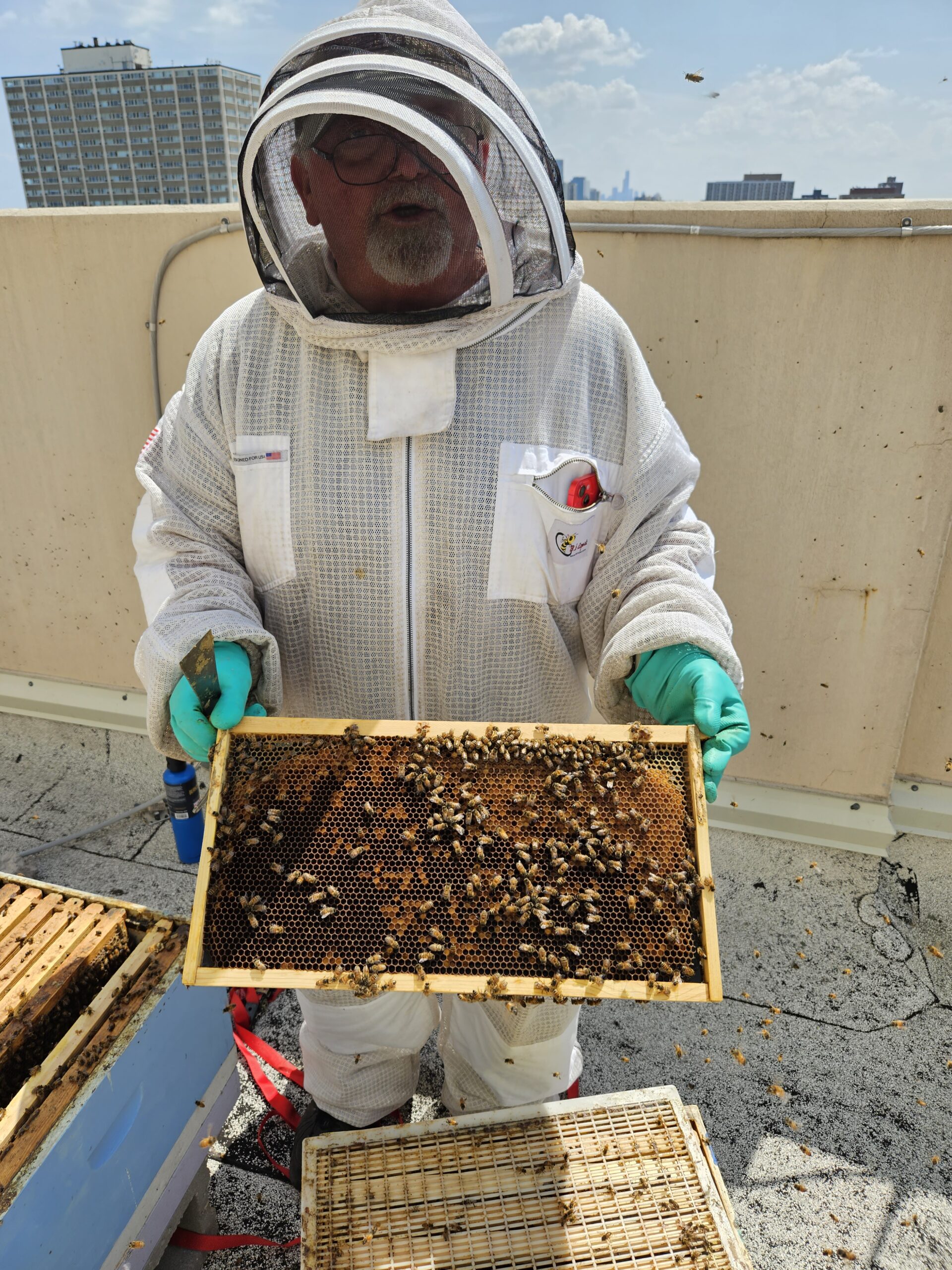Bees, Al Renslow is telling me, do not retire.
“They literally work themselves to death,” he says, spending 12 hours a day gathering nectar right up until the end of their lives, which usually last six weeks, during the summer foraging season. “Bees work all day and through the night.”
Renslow, on the other hand, is retired, from a career as a teacher with the Chicago Public Schools. He retired to the Admiral at the Lake, a senior living high-rise in Uptown, and he is devoting his least active years to tending those most active creatures, the honeybee. With his life’s work complete, he is finding meaning in tending creatures whose lives consist of nothing but work.
Renslow steps out onto a rooftop, halfway up the tower, where he keeps his hives: four wooden boxes, each with a concrete block holding down the lid. He is 74 years, meaning he’s lived more than 600 times as long as the average bee. Dressed head to toe in a white beekeeping suit, Renslow looks like an astronaut. It is a different world he’s visiting. Bees, who have brains the size of a sesame seed, are not individuals, but components of an organism. They don’t live long, “but the hive can be immortal.”
In the summertime, each hive contains 40,000 bees, meaning there are 160,000 bees on this rooftop. The human population of the Admiral is 238. Renslow recently harvested honey from one of his hives, which disturbed the bees inside. Bees carrying alarm pheromones sent out a distress signal to foragers all over the north lakefront: come home. The hive is in danger. To calm down his bees, Renslow lights an egg carton on fire with a propane torch and wafts the smoke over the hive, masking the pheromones.
Bees usually forage within three and five miles of the hive. City bees produce tastier honey than country bees, who draw their nectar from “mono-crop agriculture,” because there’s so much biodiversity in an urban neighborhood: “the different types of flowers we have, the water,” Renslow says. “Some of the trees they love. Honey in the city is very diverse. Spring honey is very citrusy.”
While the individual bee is insignificant, bees on the aggregate have been declared the most important species on the planet by the Earthwatch Institute, since they pollinate 87 percent of food crops, increasing the yield of fruits, nuts, and vegetables. Bees support the bottom of the food chain. As Albert Einstein once said, “If the bees disappear, humans would have four years to live.”
Yet the bees have been disappearing. Scientists estimate there are 2 trillion bees on Earth, but 90 percent of beehives have seen a decline in population in recent years, as a result of pesticides, deforestation, and lack of flowers. The number of managed beehives has declined by half since 1940, due to the loss of small farms that produced honey as a cottage industry. So even four hives on the rooftop of an apartment building help contribute to the survival of this essential insect. Renslow and his fellow retirees at the Admiral set up their first hives in 2021, spending $3,700 in Garden Club funds to purchase a bee colony from the Best Bees Company, a Boston organization that delivers bees and sets up hives.
“We wanted to try to expand the bee population in our urban area, but we needed to see if honey bees could survive at our location near Lake Michigan,” Renslow wrote in The Admiral’s newsletter. “We recognized that the presence of these vital pollinators was essential if our porch and window planters and our gardens were to flourish.”
The first year, the Admiral’s beekeepers only harvested 26 four-ounce bottles of honey, which they sold at the Garden Club’s October plant sale for $6 apiece. The rest, they saved for the bees. Now, they’re taking all the honey they can get. Renslow unzips his beekeeping suit, steps out and takes the elevator downstairs to the Garden Club room, where Ursula Ross, another resident, is harvesting honey. Late summer and early fall is the honey-harvesting season. Ross scrapes a layer of wax off a wooden frame and places it into a honey extractor, and turns a crank to spin it. Honey pours out a spigot and through a filter, which catches the wax. Bees buzz around the churner, some drowning in the viscous honey. There will be more bees to replace them: a queen can lay 2,000 eggs a day.
“That’s their honey,” Renslow says. “They want it.”
Beekeeping is so popular at the Admiral that the residence labels jars of honey with its name. They sent me home with one. I couldn’t wait to taste it, so I took it across the street to McDonald’s at Foster and Sheridan, where I ordered a four-piece McNugget.
“What’s the sauce?” the counter girl asked.
“No sauce,” I said. “I brought my own honey,” made in Uptown.



